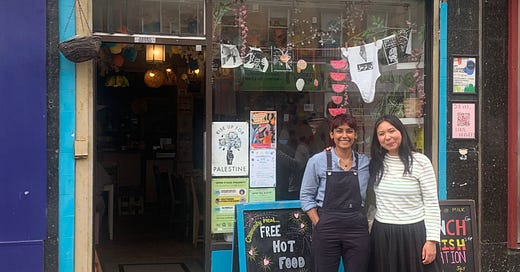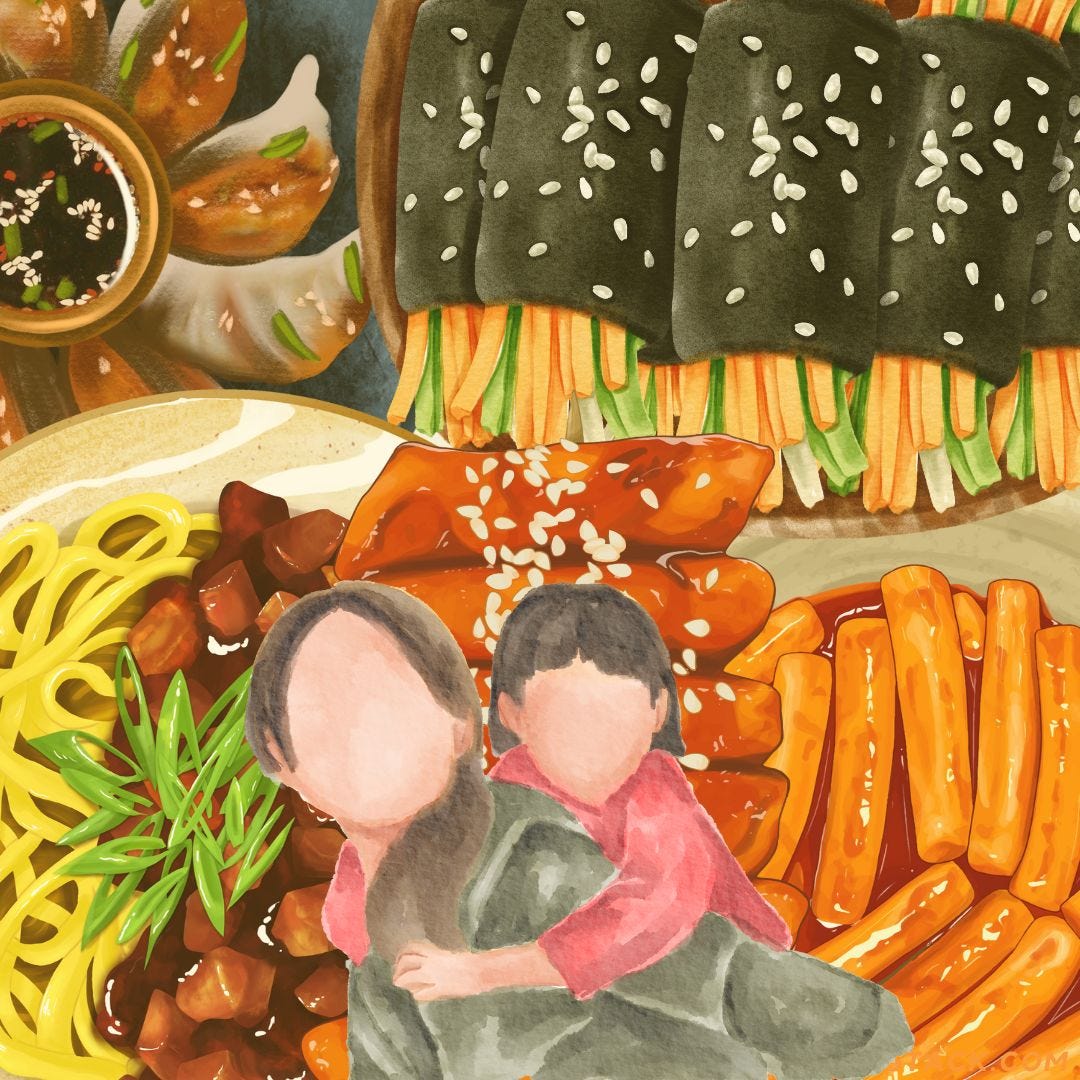Grieving Your Immigrant Parent- Lessons from 'Crying in H Mart'
Written by Shakya Seresinghe
Note from MILK: This week’s Friday morning ESOL conversation cafe was bustling and fun, full of joy, interesting chat and a huge array of cake. In short, it was an entirely fitting send-off for our MILK friend and driving force behind this blog, Shakya.
Shakya is heading off to academic pastures new, and although they will continue to visit, and work on the blog on a more casual basis, we will all miss their regular presence at MILK, and the intelligent insight wrapped in gentle and easy good humour. It’s only fitting that we showcase these great qualities in this week’s blogpost, in which Shakya shares a personal perspective on asylum, diaspora and grief in the shape of a book review. We wish them all the best for the future.
If you want to read more of their posts, I’ve made you a list!
On Roots, an Edinburgh charity supporting university students
A righteous rage at the cruelty of asylum policy in the UK
A useful guide to the best south Asian sweetshops in the Southside of Glasgow
If you want to know what a MILK outing looks like, here’s a description of a trip to the Willow Tea Rooms
And if you read today’s post and want to read more beautiful musings on family and food, here is their excellent piece on their mother’s cooking. With a recipe!
Crying in H Mart: Grieving Your Immigrant Parent
Written by Shakya Seresinghe
Convinced by my partner, I recently picked up the book Crying in H Mart, written by Michelle Zauner, whom some of you may recognise as the lead singer of the indie-pop band Japanese Breakfast. At the age of 25, just before her band rose to fame, Michelle lost her mother to cancer. Crying in H Mart is centred around this loss and explores her complicated relationship with identity and grief, particularly as a mixed-race person with a Korean mother and a white American father. The book brings forth a unique perspective on food in the context of grieving an immigrant parent, something that personally resonates with me.
Whilst reading this book last week, I was also writing last week’s post for this blog—a small reflective piece on the general election and the prospects for a humane immigration system. I couldn’t finish the piece, mostly because I was frustrated and grief-stricken. In the days following the election, the Labour government scrapped the Rwanda Bill. While this was very encouraging, it didn't feel adequate given what was introduced instead. "Smashing gangs" will not deter people from getting on small boats, however, it will continue to endanger and kill those who take this route to reach the UK.
So, I was left with not many words to say on this, except what refugees, community workers, and organisers repeat time and time again: we need safe routes to seeking asylum.
The other reason for not finishing this piece was grief itself. Three years ago, on the cusp of spring, I lost my thathi (dad) to a sudden heart attack. Reading Crying in H Mart reminded me of him and the deep-seated fear I have of losing ties to Sri Lanka—a fear I thought was very unique to having moved to the UK as a child, and as a refugee, not being able to return. Oddly, I was surprised to find this feeling reflected in Zauner's book. So, I decided to scrap the previous article and share something about this book with you all instead.
Zauner begins her story at her local H Mart (an American chain of Asian supermarkets), where she wonders in the absence of her mother, “am I even Korean if there’s no one left to call and ask which brand of seaweed we used to buy?”
In the H Mart, she is flooded by memories of the times she called her mother while shopping for the food they both loved. On the top floor, there’s a food court where she sees a Korean mother lovingly but authoritatively instructing her son on how to eat the right way, just like her mother did. To Zauner, there’s no version of Korean food that doesn’t lead back to her mother. That is the heart of this beautiful memoir: Korean food and the women who transform it from mere substance to love, memory, identity and belonging.
“… you’ll likely find me crying by the banchan refrigerators, remembering the taste of my mom’s soy-sauce eggs and cold radish soup. Or in the freezer section, holding a stack of dumpling skins, thinking of all the hours that mom and I spent at the kitchen table folding minced pork and chives into the thin dough.” (page 3)
At the age of 12 when I left Sri Lanka, I arrived here with many memories. I knew the scorching humid heat of Colombo, of picking and eating java, rambutan, and guava straight from the trees. Of walking, running, climbing trees barefoot and knowing how to read, speak, and write in Sinhala. I knew what food tasted like when it’s made in clay pots with fresh spices and curry leaves picked from the garden. Sri Lankan food was also what I ate at homes of relatives, at restaurants, in school. I remember playing cricket on the tarmac and making lanterns from plastic straws and coloured paper for Vesak. I also knew of the political violence, the authority with which it disrupted life, making it dangerous to pick up a phone call, walk home at night, or go to school.
When I moved to the UK, something shifted. As I became a teenager, and an adult, my memories slowly faded, and my parents became my sole connection to the island. Sri Lankan food became what my mother cooked for me. I heard about what was happening in Sri Lanka—the news, the politics—but as my ability to read in Sinhala faded, my parents became my translators. When my thathi passed away, it occurred to me that parts of the bridge —the one that bonds me to Sri Lanka—had collapsed. My mother held what remained together.
Like Zauner, I call my amma and pester her for Southern Sri Lankan recipes while searching through the aisles of our local South Asian supermarket, Maqbool. As I am living in a household that doesn't tolerate much spice, I find myself itching desperately to go home and taste my amma’s food after just a month of not seeing her.
My grief over losing my father is complicated—it has bled into my feelings about my amma, and worrying and anticipating a future in which I might be alone here, without her company and without her food. Am I even Sri Lankan in the absence of my parents? Like Zauner, I often find myself worrying.
Crying in H Mart takes you on a journey from the early years Zauner spent with her mother visiting family in Korea to the loss of her grandmother and aunt. It explores the gruelling months of caring for her ill mother and the time that followed her death. Cooking and recreating tastes and smells becomes a reliable means of grappling with the loss of her loved ones and feeling a bit closer to her Korean self in their absence.
I’ll leave you all with a final quote from the book:
“I had thought fermentation was controlled death. Left alone, a head of cabbage molds and decomposes. It becomes rotten, inedible. But when brined and stored, the course of its decay is altered. Sugars are broken down to produce lactic acid, which protects it from spoiling. Carbon dioxide is released and the brine acidifies. It ages. Its colour and texture transmute. Its flavour becomes tarter, more pungent. It exists in time and transforms. So it is not quite controlled death, because it enjoys a new life altogether.”
Kim Supajirawatananon and Shakya Seresinghe act as the overall contributors for the blog, pitching article ideas, putting together articles, posting, and making small edits. We also run a peer-writers project on the side, where creatives from the wider community support the blog through editing, interpreting, translating etc. This blog is a collective effort, and we thank everyone for their contributions.
All our content is free. If you can, we ask you to consider making a small pledge so we can compensate the contributors in small ways.
Thank you very much.








Wishing Shakya and her partner all the best for the future.
With much love,
Trees FewsterXx